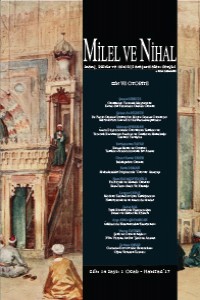İslam Düşüncesinde Otoritenin Tarihsel ve Teolojik Kurulumu: Allah’ın ve Sultân’ın Mutlaklığı Üzerine Tartışma
Abstract
İlk Müslüman neslin yaşadığı en önemli sorun iktidarın yeniden-kurulması
olmuştur. Konu din tarafından doğrudan belirlenmediği için, oldukça zengin
ve hareketli tartışmalar yaşanmıştır. Siyasette herkesi memnun edecek
nihaî bir ..zümün bulunmadığı düşünüldüğünde, Müslüman toplumunda
da ilk anda ‘rahatsız’ bir kesimin oluştuğu anlaşılır. ‘Rahatsız ve memnun
olmayan’ isimler, zamanla toplumsal bir muhalefet simgesi haline getirilmiştir.
Toplumda somut iktidar mücadelesi sürerken, bunun yanında entelektüel
alanda otorite de tanımlanmaktaydı. Kurulu düzeni normalize eden
teolojik söylemin yanında, itirazı ebedîleştiren ve mevcudu sorgulayan bir
başka teolojik söylem de gelişmiştir. Bunun yanında bazı saf teolojik tartışmalar
da dolaylı olarak kendi iktidar tasavvurlarını kurmuşlardır. Toplumsal
ve tarihsel rekabet hem iktidar hem de dinî inanç düzeyinde
yaşanmıştır. Müslüman mirası da bu rekabet ve mücadelenin anlatımlarını
yansıtmaktadır. Bu çalışmada, İslam düşüncesinde siyasal düşünme tarzının
ortaya çıkışı, iktidarın kurulması, mevcut iktidara destek sunan ya da
muhalefet eden anlayışların teolojik kurguları ele alınacak, Tanrı’nın otoritesinin
dünyev. siyasete ve gü. arayışına nasıl dahil edildiği sorunu, FETÖ
üzerinden tartışılacak, bir kelam tartışması olan sıfatlar konusunun, ahlak
tasavvuru dolayımında otoriteye yansımaları incelenecektir.
Keywords
References
- Akbulut, Ahmet, Sahabe Dönemi İktidar Kavgası-Alevî Sünnî Ayrışmasının Arkaplanı, Ankara, 2015.
- Çelebi, İlyas, İslam İnanç Sisteminde Akılcılık ve Kadı Abdulcabbâr, Rağbet Yayınları, İstanbul, 2002
- Düzgün, Şaban Ali, “Sol İlahiyat: Dinin Sol Yorumunun İmkânı, Riskleri ve Sınırları”, Kelam Araştırmaları Dergisi, yıl 12, sayı 2, ss. 1-22, 2014.
- Eagleton, Terry, Tanrı’nın Ölümü ve Kültür, çev. Selin Dingiloğlu, Yordam Kitap, İstanbul, 2014. Eşarî, Ebu’l-Hasan, Lum’a, Kahire, 1955.
- Evkuran, Mehmet, Mehmet Evkuran, Ahlak Hakikat ve Kimlik- -İslam Kelâmında Ahlâk Problemi, Araştırma Yayınları, Ankara, 2013.
Historical and Theological Establishment of Authority in Islamic Thought: Discussion on the Absolute of Allah and the King/Sultan
Abstract
The most important problem
that the first Muslim generation have confronted was re-establishment of the
power. Since the subject was not directly determined by religion, there were
quite rich and active discussions. It is difficult to find a final solution
that please everybody in politics thus a ‘uncomfortable’ cohort emerged at the
first moment in the Muslim society. The names whose 'uncomfortable and
dissatisfied' were gradually turned into social opposition symbols. While the
struggle for power continued in society, authority was defined at the
intellectual level as well. In addition to the theological rhetoric that
normalized the order of the board, another theological discourse that has
questioned the objectors and the residents has developed. In addition, some
theological debates have established their own ideas of power, directly or
indirectly. Social and historical competition has been experienced both at the
level of power and religious belief. This study deals with the emergence of
political thought and the establishment of power in the Islamic tradition. The
theological constructions of discourses supporting or opposing power are
examined. The question of how the authority of God is included in the quest for
worldly politics and power will be discussed through the FETÖ and finally the
reflections of God's attributes to authority in the context of moral conception
will be examined.
Keywords
References
- Akbulut, Ahmet, Sahabe Dönemi İktidar Kavgası-Alevî Sünnî Ayrışmasının Arkaplanı, Ankara, 2015.
- Çelebi, İlyas, İslam İnanç Sisteminde Akılcılık ve Kadı Abdulcabbâr, Rağbet Yayınları, İstanbul, 2002
- Düzgün, Şaban Ali, “Sol İlahiyat: Dinin Sol Yorumunun İmkânı, Riskleri ve Sınırları”, Kelam Araştırmaları Dergisi, yıl 12, sayı 2, ss. 1-22, 2014.
- Eagleton, Terry, Tanrı’nın Ölümü ve Kültür, çev. Selin Dingiloğlu, Yordam Kitap, İstanbul, 2014. Eşarî, Ebu’l-Hasan, Lum’a, Kahire, 1955.
- Evkuran, Mehmet, Mehmet Evkuran, Ahlak Hakikat ve Kimlik- -İslam Kelâmında Ahlâk Problemi, Araştırma Yayınları, Ankara, 2013.
Details
| Journal Section | Articles |
|---|---|
| Authors | |
| Publication Date | June 29, 2017 |
| Submission Date | June 29, 2017 |
| Published in Issue | Year 2017 Volume: 14 Issue: 1 |

